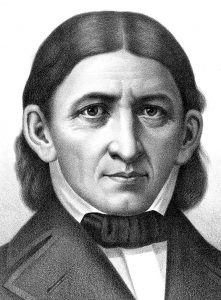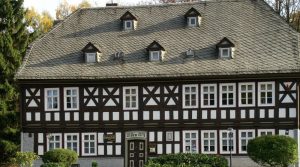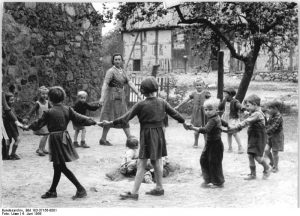 Many people think of Kindergarten as almost a play date. They think of a classroom filled with toys, books, and craft supplies, as well as a playground for recess. Many people think of it as a daycare for working parents, and of course, a place for early childhood development. All these are good things, but this was not the original plan for the creator of Kindergarten, German born Friedrich Wilhelm August Fröbel. He wanted it to be a place that was both ‘a garden for children’, where children meet with environment and also ‘a garden of children’, where they play together and express themselves in a smaller garden world by means of play with their age group. He believed that “children are like tiny flowers; they are varied and need care, but each is beautiful alone and glorious when seen in the community of peers.”
Many people think of Kindergarten as almost a play date. They think of a classroom filled with toys, books, and craft supplies, as well as a playground for recess. Many people think of it as a daycare for working parents, and of course, a place for early childhood development. All these are good things, but this was not the original plan for the creator of Kindergarten, German born Friedrich Wilhelm August Fröbel. He wanted it to be a place that was both ‘a garden for children’, where children meet with environment and also ‘a garden of children’, where they play together and express themselves in a smaller garden world by means of play with their age group. He believed that “children are like tiny flowers; they are varied and need care, but each is beautiful alone and glorious when seen in the community of peers.”
I’m sure this sounds odd to most of us, but when you look at his background, I think you will understand why he felt the way he did. Fröbel had an unhappy childhood with a severe step-mother. He was abandoned and treated in a strict fashion as a child. He got to know what happiness was, when he was living with his uncle’s family while studying at high school. He had a huge desire for education, strong Christian faith and love of nature. He studied mineralogy in Jena,  Germany and architecture at the Berlin’s Humboldt University. Inborn skills of an educator helped Fröbel to realize the failure of teaching system because of its incompleteness and the failure to include the outside world in the educational process. The first kindergarten was established by Fröbel in Bad Blankenburg in 1837. He renamed his Play and Activity Institute to a ‘kindergarten’ two years later in 1840. That Bad Blankenburg Infant school used play, games, songs, stories, and crafts to encourage children’s imagination and broaden their physical and motor skills. “Kommt, lasst uns unsern Kindern leben” Come, let us live with our children’ turned into the catchphrase of the early childhood education.
Germany and architecture at the Berlin’s Humboldt University. Inborn skills of an educator helped Fröbel to realize the failure of teaching system because of its incompleteness and the failure to include the outside world in the educational process. The first kindergarten was established by Fröbel in Bad Blankenburg in 1837. He renamed his Play and Activity Institute to a ‘kindergarten’ two years later in 1840. That Bad Blankenburg Infant school used play, games, songs, stories, and crafts to encourage children’s imagination and broaden their physical and motor skills. “Kommt, lasst uns unsern Kindern leben” Come, let us live with our children’ turned into the catchphrase of the early childhood education.
Friedrich Fröbel also used studying and nurturing plants in a garden for stimulating children’s interest in the natural world. In reality, we can trace the similarities to the Montessori school system and the Pestalozzian consideration of importance to grow up in harmony with nature. Fröbel paid much attention to preparing for  further school education by training the children through the complimentary self expression, creativeness, collective involvement, and motor activity. He considered training of all the vivid faculties: artistic, imaginative, linguistic, arithmetical, musical, aesthetic, scientific, physical, social, moral, cultural, and spiritual, complete growth and harmonious development to be even more important than any kind of knowledge. Fröbel’s kindergarten system flourished globally. Most kindergartens were organized for children of all social classes, ethnic groups and religious believes, Jewish as well as Christian. Fröbel’s vision of kindergarten seems to be so familiar and proper, however it was a fresh and revolutionary look on early childhood education in his time.
further school education by training the children through the complimentary self expression, creativeness, collective involvement, and motor activity. He considered training of all the vivid faculties: artistic, imaginative, linguistic, arithmetical, musical, aesthetic, scientific, physical, social, moral, cultural, and spiritual, complete growth and harmonious development to be even more important than any kind of knowledge. Fröbel’s kindergarten system flourished globally. Most kindergartens were organized for children of all social classes, ethnic groups and religious believes, Jewish as well as Christian. Fröbel’s vision of kindergarten seems to be so familiar and proper, however it was a fresh and revolutionary look on early childhood education in his time.


Leave a Reply